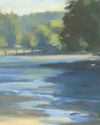
1 CHOOSE SUPPORTS CAREFULLY
Consider your support carefully before beginning. If you’re painting with oils or acrylics and want a smoother finish, try using a prepared wooden panel or a fine cotton or even linen canvas.
With watercolour, the texture of your paper can have a huge bearing on how the paint behaves too. A rough paper can be useful for showing the sparkling highlights of light on water as the paint fails to settle in some of the dinks in the surface, while the hotpressed paper is very smooth, allowing for wet-in-wet washes that could suggest softer reflections. A coldpressed (or NOT) paper is a good mid-point between the two.
2 STUDY THE OPACITY EXPERT TIP
– Kate Brinkworth: “Whatever the subject matter, choosing the right paint can really help, especially with reflections. I try to think quite literally with paint: transparent paints for transparent objects and opaque paints for more solid areas. (Most paints contain information about opacity on the tube or packaging.)
“A transparent colour can be thinned down with oil to allow a white background to show through or to glaze over the top. I avoid pure white, instead using this technique to achieve paler tones. This can really help to show the qualities that a reflection possesses.”
3 WORK DOWNWARDS
Reflections in moving water tend to become more abstracted the further they and the subject gets from the surface of the water. They also appear to come “towards” the viewer.
This story is from the September 2021 edition of Artists & Illustrators.
Start your 7-day Magzter GOLD free trial to access thousands of curated premium stories, and 9,000+ magazines and newspapers.
Already a subscriber ? Sign In
This story is from the September 2021 edition of Artists & Illustrators.
Start your 7-day Magzter GOLD free trial to access thousands of curated premium stories, and 9,000+ magazines and newspapers.
Already a subscriber? Sign In

Still life IN 3 HOURS
Former BP Portrait Award runner-up FELICIA FORTE guides you through a simple, structured approach to painting alla prima that tackles dark, average and light colours in turn

Movement in composition
Through an analysis of three masterworks, landscape painter and noted author MITCHELL ALBALA shows how you can animate landscape composition with movement

Shane Berkery
The Irish-Japanese artist talks to REBECCA BRADBURY about the innovative concepts and original colour combinations he brings to his figurative oil paintings from his Dublin garden studio

The Working Artist
Something old, something new... Our columnist LAURA BOSWELL has expert advice for balancing fresh ideas with completing half-finished work

Washes AND GLAZES
Art Academy’s ROB PEPPER introduces an in-depth guide to incorporating various techniques into your next masterpiece. Artwork by STAN MILLER, CHRIS ROBINSON and MICHELE ILLING

Hands
LAURA SMITH continues her new four-part series, which encourages you to draw elements of old master paintings, and this month’s focus is on capturing hands

Vincent van Gogh
To celebrate The Courtauld’s forthcoming landmark display of the troubled Dutch master’s self-portraits, STEVE PILL looks at the stories behind 10 of the most dramatic works on display

BRING THE drama
Join international watercolour maestro ALVARO CASTAGNET in London’s West End to paint a dramatic street scene

Serena Rowe
The Scottish painter tells STEVE PILL why time is precious, why emotional responses to colour are useful, and how she finds focus every day with the help of her studio wall

Bill Jacklin
Chatting over Zoom as he recovers from appendicitis, the Royal Academician tells STEVE PILL about classic scrapes in New York and his recent experiments with illustration